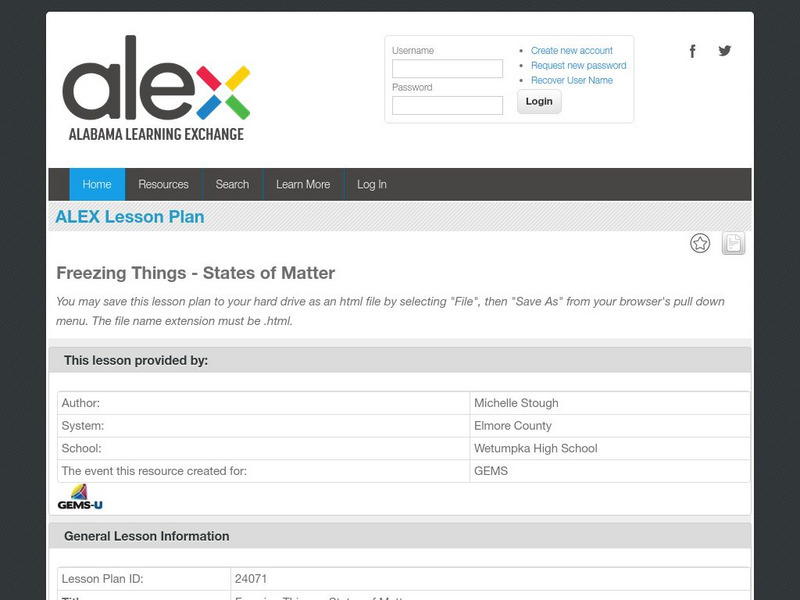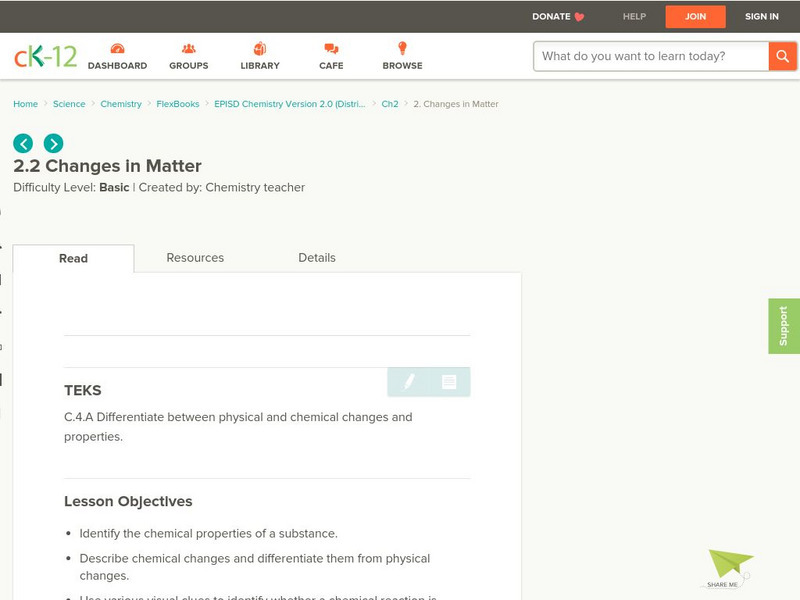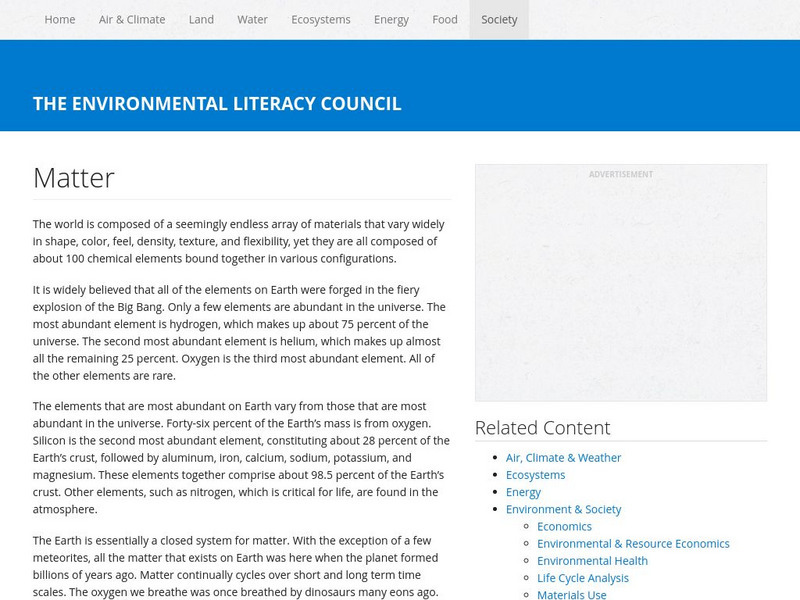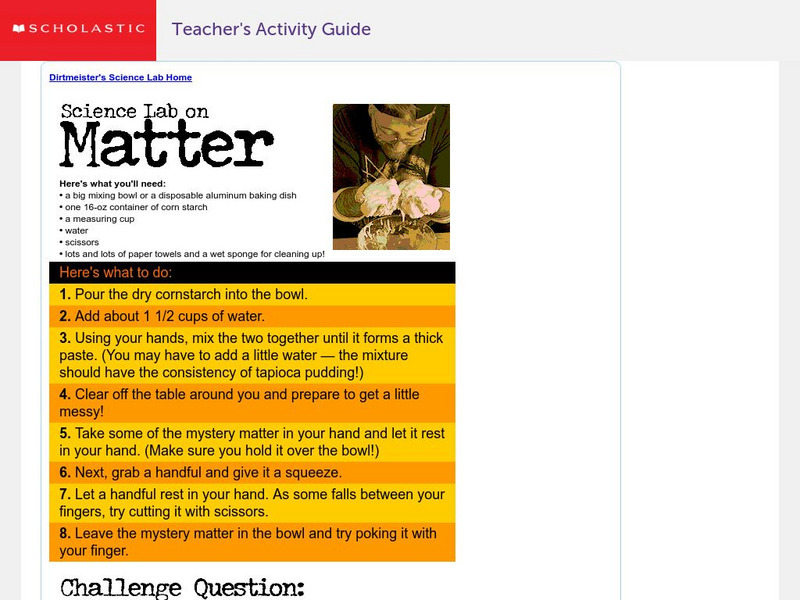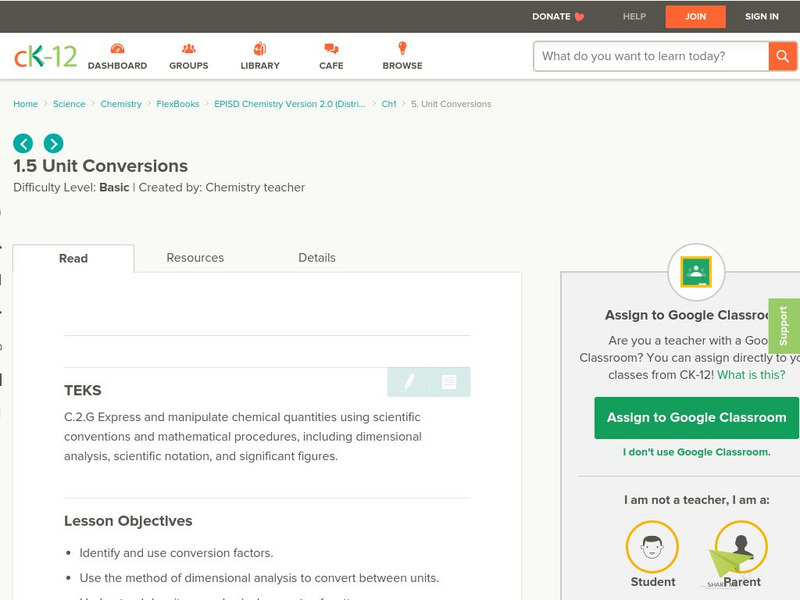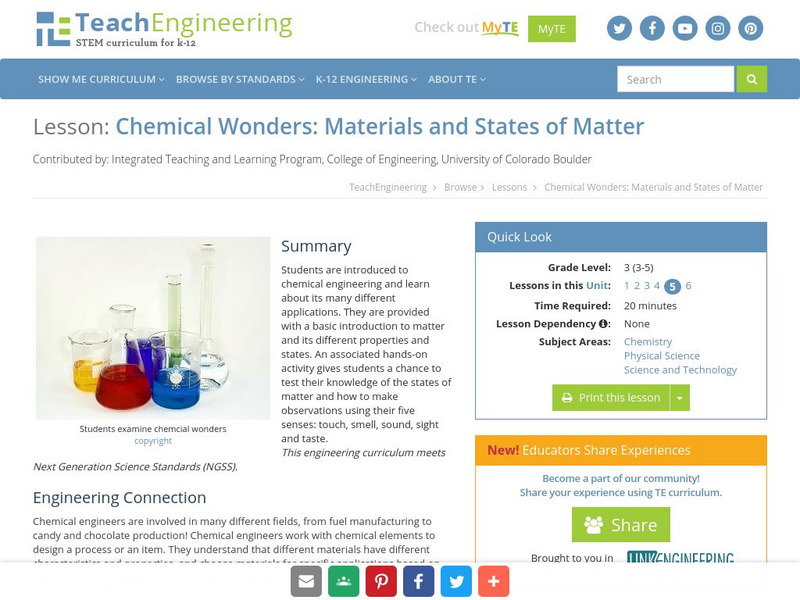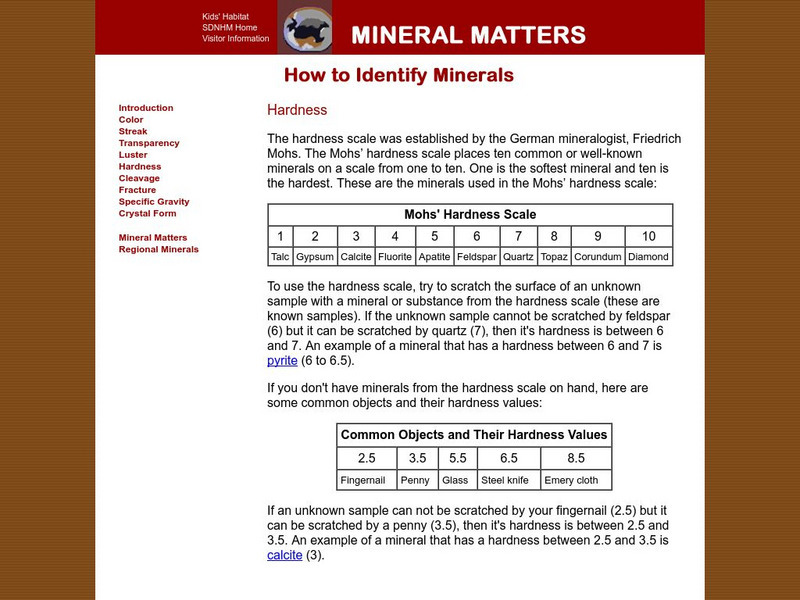Hi, what do you want to do?
NASA
Nasa: Light but Strong
Use these lessons from NASA to teach multiple Next Generation Science Standards for grades K-5. Properties of matter and engineering design are the focus of these lessons. Detailed plans and student handouts are included. [PDF]
Alabama Learning Exchange
Alex: Freezing Things: States of Matter
The class will go back over the Power Point presentation on chemical and physical properties. The teacher will then conduct numerous liquid nitrogen demos. This lesson is used early in the Chemistry course. The students love it. This...
CK-12 Foundation
Ck 12: Changes in Matter
[Free Registration/Login may be required to access all resource tools.] In the following online tutorial students identify the chemical properties of a substance and describe chemical changes and differentiate them from physical changes....
The Environmental Literacy Council
Environmental Literacy Council: Matter
Learn about the considerable variety of materials on Earth, and the basic properties which set them apart. Read how all matter on Earth comes into play when it comes to environmental issues.
Scholastic
Scholastic: Dirtmeister's Science Lab: Matter
Students will use water and cornstarch to make a mystery matter, and then discuss what happens when different energy is applied.
Other
Science4us: States of Matter
In the States of Matter module, students further explore the concept that anything on earth that has mass and takes up space is matter. This exercise introduces students to solids, liquids and gases, the three most common states of...
CK-12 Foundation
Ck 12: Unit Conversions
[Free Registration/Login may be required to access all resource tools.] In this online tutorial students will begin to identify and use conversion factors and to also use the method of dimensional analysis to convert between units....
American Chemical Society
Middle School Chemistry: Molecules Matter
Students observe and discuss water on the molecular level using the idea that water is composed of tiny molecules that are attracted to one another.
TeachEngineering
Teach Engineering: Chemical Wonders
Learners are introduced to chemical engineering and learn about its many different applications. They are provided with a basic introduction to matter and its different properties and states. An associated hands-on activity gives...
Other
Science4 Us: Observing Matter
Students begin to learn the words to describe matter correctly and accurately, learning important skills for communicating scientific information. They will also observe using their senses and scientific tools to measure numerical...
Science Education Resource Center at Carleton College
Serc: Measuring and Comparing Matter
In this activity, students will measure a variety of different materials from the classroom to determine how much matter is found in these materials then determine the mass of these materials using the same volume for each. The data will...
PBS
Pbs Learning Media: Periodic Table of the Elements Essay
This essay, written for Teachers' Domain, describes the foresight and pattern recognition that Russian chemist Dmitri Mendeleyev used to develop the modern periodic table of elements.
University of Texas at Austin
The University of Texas Mc Donald Observatory: Spectroscope
This lesson guides students to build a spectroscope, use it as a tool, and interpret their observations by applying concepts of conservation of energy and properties of matter.
ClassFlow
Class Flow: Matter Review
[Free Registration/Login Required] Review the three forms of matter with this flipchart. This could also be used for a pre-assessment before a unit on matter.
ClassFlow
Class Flow: Does Matter Really Matter?
[Free Registration/Login Required] This flipchart teaches the different states of matter. Use the magic revealer to check your answers in this creative flipchart full of many examples and activities.
TeachEngineering
Teach Engineering: Antimatter Matters
Antimatter, the charge reversed equivalent of matter, has captured the imaginations of science fiction fans for years as a perfectly efficient form of energy. While normal matter consists of atoms with negatively charged electrons...
American Chemical Society
Inquiry in Action: Powder Particulars
In this activity, students will learn how to use reactivity properties of substances to distinguish between similar-looking substances. This lab experiment includes student and teacher information sheets.
San Diego Natural History Museum
San Diego Natural History Museum: Mineral Matters: Hardness
Identifying a mineral by hardness? This website explains how to use the Mohs' hardness scale and provides examples.
Science and Mathematics Initiative for Learning Enhancement (SMILE)
Smile: Gases Lighter and Heavier That Air
Teachers, to demonstrate to the elementary student that some gases are heavier than others, this experiment uses Winnie the Pooh and balloons to do just that.
San Diego Natural History Museum
San Diego Natural History Museum: Mineral Matters: Grow Your Own Crystals
Here are step-by-step instructions on how to create crystals. This is a great experiment for students to use in learning about the structure and formation of crystals.
TeachEngineering
Teach Engineering: Measuring Viscosity
Students calculate the viscosity of various household fluids by measuring the amount of time it takes marble or steel balls to fall given distances through the liquids. They experience what viscosity means, and also practice using...
Sophia Learning
Sophia: Chemical and Physical Properties Defined
This lesson will define chemical and physical properties and introduce methods used in chemistry to measure chemical and physical properties.
New York University
New York University: States of Water
Use this resource to learn about the three different phases of water; solid, liquid, and gas. What happens to water as it changes into a solid or gas? Includes short and easy to do activity.
American Chemical Society
Middle School Chemistry: What Is Density?
Calculate the density of cubes made of different materials to determine what type of material it contains. Using this information explain that the size, mass, and arrangement of the atoms or molecules of a substance determines its density.






